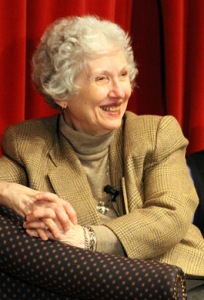The second in the animate: Practices series launches today. We’re proud to partner with Augsburg Fortress in presenting some of the animate series as ChurchNext courses. The series is unique in that it not only tackles some of the big questions of our faith, like “Is God real?” and “Is there such a thing as too much Bible?” but it does so not in order to teach a certain lesson or to impart fixed wisdom, but to challenge assumptions, spark conversation and dialogue, and encourage wrestling with the deep questions of our souls.
In this latest course, pastor Mike Slaughter and author-theologian Phyllis Tickle encourage us to take a second look at our assumptions about and definitions of both “worship” and “sacraments.” Both Mike and Phyllis remind us that these terms mean different things to different people, and that they have become in many ways slippery and changeable terms in our minds. And yet both of these words are crucial to the origins and future of our spiritual lives. Worship is a practice by which we connect with God and within a community of people on the same path; the sacraments can tell us a great deal about both what we believe we’re saying to God and what God may be saying to us as we participate in worship and sacred rites.
Check this course out — it’s a wonderful thought- and conversation-starter on some topics we may rarely consider. Click here for more information or to register.
 Mike Slaughter, lead pastor at Ginghamsburg Church, is in his fourth decade as the chief dreamer of Ginghamsburg Church and the spiritual entrepreneur of ministry marketplace innovations. His life-long passion to reach the lost and set the oppressed free has now made him a tireless and leading advocate for the children, women and men of Darfur, Sudan, named by the U.N. as the worst humanitarian crisis in the world today. Mike’s call to afflict the comfortable and comfort the afflicted will challenge attendees to wrestle with God and their God-destinies.
Mike Slaughter, lead pastor at Ginghamsburg Church, is in his fourth decade as the chief dreamer of Ginghamsburg Church and the spiritual entrepreneur of ministry marketplace innovations. His life-long passion to reach the lost and set the oppressed free has now made him a tireless and leading advocate for the children, women and men of Darfur, Sudan, named by the U.N. as the worst humanitarian crisis in the world today. Mike’s call to afflict the comfortable and comfort the afflicted will challenge attendees to wrestle with God and their God-destinies.
Phyllis Tickle, founding editor of the Religion Department of PUBLISHERS WEEKLY, the international journal of the book industry, is frequently quoted in print sources, electronic media, and innumerable blogs and web sites. Tickle is an authority on religion in America and a much sought after lecturer on the subject. In addition to lectures and numerous essays, articles, and interviews, Tickle is the author of over three dozen books on religion and spirituality.Phyllis Tickle, founding editor of the Religion Department of PUBLISHERS WEEKLY, the international journal of the book industry, is frequently quoted in print sources, electronic
international journal of the book industry, is frequently quoted in print sources, electronic media, and innumerable blogs and web sites. Tickle is an authority on religion in America and a much sought after lecturer on the subject. In addition to lectures and numerous essays, articles, and interviews, Tickle is the author of over three dozen books on religion and spirituality.Phyllis Tickle, founding editor of the Religion Department of PUBLISHERS WEEKLY, the international journal of the book industry, is frequently quoted in print sources, electronic




